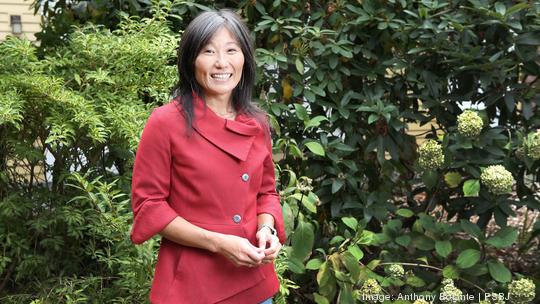
Yoko Miyashita faced a tough challenge when she took over the CEO role of the digital cannabis marketplace Leafly in August 2020.
The world was facing a pandemic, and employees were working from home. The company had laid off more than 140 employees earlier in the year. Plus, a summer of activism was forcing individuals and companies to confront America’s history of racism, something particularly relevant in the cannabis industry.
“For us, it’s about how do you take your employees through what is this macro environment of civil unrest and a pandemic and then situate yourself in this industry that’s grappling with its own history of prohibition and disproportionate impact,” Miyashita said. “We were in early spring burning and came out of the year cash-flow even and a break-even company.”
Leafly, which allows consumers to shop and research cannabis products online, is now headed for an initial public offering through a merger with the special purpose acquisition company Merida Merger Corp. I in a deal expected to close in the fourth quarter. The company is hiring again and is projecting roughly $43 million in revenue this year and $65 million next year.
The Business Journal sat down with Miyashita to talk about the challenges she has faced as CEO and what it’s been like leading a cannabis company throughout the pandemic.
You became the CEO after joining the company just over a year earlier as the general counsel. What was that process like? To understand where strategic opportunity is in cannabis, you actually have to understand the regulatory framework. Each state has its own set of regulations. You have to be watching the federal landscape. You have to be watching what’s happening internationally to understand where your room is to move and grow. For me taking the role of general counsel was a strategic business role to start. That transition to CEO when my predecessor stepped down was really a function of, again, back to being surrounded by a very talented and seasoned group of executives where my background as a lawyer and their backgrounds in their respective areas could allow me to be successful.
What are some of the challenges of going public as a cannabis company? A little bit of Cannabis 101: If you are a plant-touching company, whether you’re growing, processing or you’re actually involved in the distribution channel, you don’t have the U.S. public markets accessible to you. So what’s happened over the course of the last three to five years is that any plant-touching company that wanted to access the public markets has had to go via Canadian exchanges. What that leaves are the non-plant-touching, ancillary businesses that are of a size and scale that can actually list on the U.S. exchange. There’s very few, and we’re very proud of the fact that we’re one of them.
How does Leafly navigate the tricky national landscape around marijuana, with different states being at varying levels of legalization and it still being illegal federally? It’s why you need lawyers, right? We keep track at multiple levels. With our news and editorial team, you can always find the status of any state’s legalization and where they are on that journey. It’s super important to our mission of keeping consumers informed in what’s happening in that landscape. But from an actual business perspective, we’re also tracking this in real time to understand what exactly those regulations are, where they’re developing and what can and can’t be done in those states.
SPACs are all the rage right now, but a lot of people have criticized them for being a sort of short-cut to go public for businesses that are struggling. What is your counter to that? I view SPACs as any other investment vehicle. I think that’s where my background helps coming into this being a trained lawyer and understanding what it actually means to access the public markets. It’s all about massing up your organizational maturity and where you are in that process.
How did the pandemic affect your growth? Retailers, depending on the state, some had to shut down in-person operations and were forced to go to curbside. What that meant was the only way consumers could access cannabis was if they reserved online in advance and picked up. You can imagine tools like ours take on a significance that was outsized compared to what we were seeing. Our online ordering platform was something we introduced to the market in 2018, and we just saw exponential growth in terms of adoption.
What’s one thing your employees probably don’t know about you? I’m afraid of rodents.
Did that spawn from something in your childhood? No. It spawns from imagination.
This interview has been edited for length and clarity.
About Yoko Miyashita, CEO of Leafly
- Age: 46
- Education: Undergrad at the University of California, Berkeley; law degree at the University of Washington
- Hometown: Born in Japan but spent some of her childhood in Chicago and Houston before finishing high school in Los Angeles (now a long-time resident of Seattle)
- Residence: “Winderhurst” (a small neighborhood located between Laurelhurst and Windermere)
- Interests outside of work: Surfing, snowboarding, skiing, running, reading, eating and being a soccer mom








